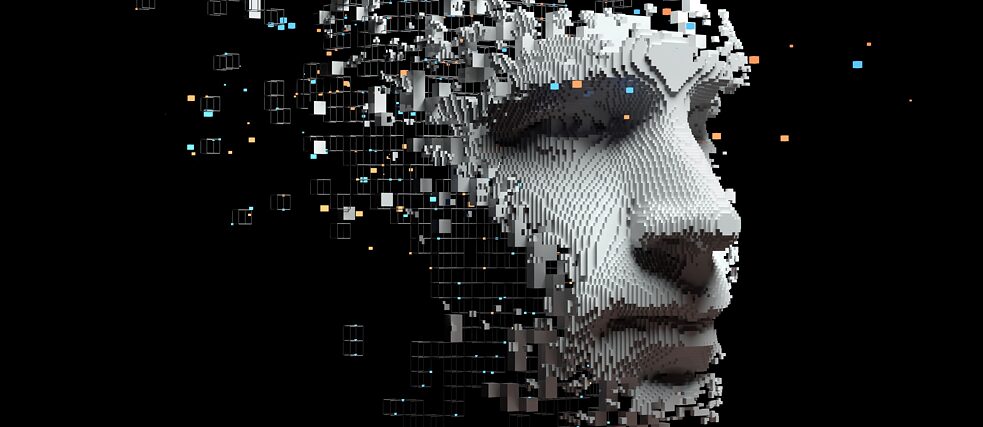Algorithms
“Digital Capitalism Fakes Empowerment”

We work, shop, read and game in a digital environment, not to mention our social media activities. Alexa organizes our day-to-day household tasks, while the smartwatch on our wrist tells us when it’s time to start moving again. Digitality’s everywhere. Media scholar Tung-Hui Hu explores exhaustion and disappointment in the digital age. We spoke to him about how digital lethargy affects our lives – even when we’re offline.
Tung-Hui Hu, in your latest book you argue that digital capitalism has led us into an ‘Age of Disconnection’. What is digital capitalism and how does it affect our daily lives?
Digital capitalism is the extension of capitalism to include not just data and information, but also the way in which everyday life is mediatised. Even if you’re offline, you’re still affected by digital capitalism. For example, algorithmic processes influence how we shop or how much we sleep. And they constantly push us to be authentic individuals – to express our opinions all the time, make choices, and be active and engaged – which can be quite tiring. This leads to the state that I call digital lethargy – which is also the title of my book.
You’ve described digital lethargy as the state ‘when you don’t want to be yourself, when being yourself becomes burdensome’. Can you give an example?
If you’re an Uber driver who wants a high rating, you’re advised to be yourself around customers. You’re supposed to talk about your interests and hobbies, to present yourself as an authentic part of the city, and so on. But being yourself is not only crucial for customer service jobs; it’s the new form of work. I think more and more people resent this feeling of being always on, and how its real purpose is to produce more data for personalisation algorithms. Digital lethargy is what happens when we just want to be passive and scroll without interacting or making choices. While digital lethargy can feel a bit like being a robot rather than being a person, it’s also a rejection of the unrealistic requirement to be lively all the time.
Ten or twenty years ago, in the wake of the Arab Spring, the concept of digital empowerment received a lot of attention. The idea was that people could use technology to organise themselves in the fight against oppression. What has become of this idea?
Digital empowerment has been thoroughly co-opted by digital capitalism. Under the guise of empowerment, digital capitalism asks users not just to click and share but to speak up and fight back. But it’s a fantasy of individual rather than collective action, a fantasy that being loud equates to being political nowadays. This has deep roots in the history of digital culture. Back in the Silicon Valley of the 1970s and 80s, digital empowerment grew out of the idea that everybody could speak out against authority on the internet, and no one could be silenced or censored. Digital capitalism fakes that. It takes just a fraction of what activism looks like – for example, the ability to criticise –– and ensures that it unfolds on a data-gathering platform like Twitter. A lot of the tactics that seemed potent ten or twenty years ago have been incorporated into the system. So, I think it’s time to think about a different set of tactics.
What kind of tactics might they be?
Firstly we should ask ourselves who is excluded by a policy of loudness, namely people of colour and people in the Global South. The media are always looking for heroic forms of protest. But we should instead be listening to creative ways of staying afloat within the digital economy, and how they draw strength to endure. Secondly we should embrace forms of inaction, such as loitering online, feeling stuck, or quiet quitting, which move us away from those values of productivity and (self-) growth promoted by digital capitalism. We must think about tactics that are quieter, less confrontational and do not necessarily look like resistance.
 Would an “Arab Spring” still work today? The protests for more democracy, like these ones in Egypt in 2012, were primarily organised through social media. Tung-Hui Hu believes it’s time for new approaches.
| Photo (detail): © picture alliance/dpa/wostok P/Virginie Nguyen Hoang
What is structure of digital capitalism?
Would an “Arab Spring” still work today? The protests for more democracy, like these ones in Egypt in 2012, were primarily organised through social media. Tung-Hui Hu believes it’s time for new approaches.
| Photo (detail): © picture alliance/dpa/wostok P/Virginie Nguyen Hoang
What is structure of digital capitalism?
Digital capitalism requires a tremendous amount of effort and work to keep the system going. This includes the people who mine lithium for electronic devices, people who train the artificial intelligence that powers those devices, the warehouse staff who pack and ship them... This creates a digital underclass – all the people in the supply chain who are not only kept out of sight, but are in fact deliberately hidden. People who are treated as if they were robots. This again happens under the guise of empowerment. One example is a company that came to Kenya and said that they were there to create good jobs. They made their presence seem like a humanitarian effort. But the jobs are terrible – for instance content moderators, who have to watch violent videos all day. Of course, there is some degree of overlap with other forms of capitalism too. The extraction of resources from the ground is not that different from the extraction of data. For example, Zimbabwe sold access to their entire electoral database to a Chinese company wanting to train their facial recognition software on Black faces.
Is the digital underclass concentrated in the Global South?
This disposable labour pool is concentrated in the Global South, but it can be seen in rich countries too. For example in the United States, Amazon advertised that performing micro tasks could be a ‘fun hobby’ for housewives. But of course there are already entrenched inequalities and digital capitalism only intensifies them. Think for example of call centres, where people work on repetitive tasks all day like robots. They are often outsourced to lower-income countries like the Philippines. Digital capitalism is an agent of dehumanisation. It tries to teach us that some people are less than human.
Can digital capitalism be redesigned or regulated to become less dehumanising?
Regulation is certainly possible; for example, GDPR in the European Union has shown that it is possible to regulate data. And digital capitalism can be re-envisioned, too. The internet is organised around little neighbourhoods personalised to your tastes, so that you are surrounded by people that you like. However this can be damaging because it leads to filter bubbles. We could change this by designing social networks a little bit differently. At the moment they are mostly designed around how angry and loud people are. Professor Wendy Chun suggests that we should design networks around indifference, so that scrolling would be more like walking down a street in the city where you can be indifferent to a person, rather than immediately agreeing or disagreeing with them. But the biggest thing that we can do, in conceptual terms, is to move away from designing networks around the needs of the hyper-individual “user” and instead towards collective forms of life.
Who profits most from digital capitalism?
Digital capitalism requires the concentration of data on platforms. So it’s the companies with the money to concentrate users on their platforms and then lock them in that profit most.
Most of these companies are US-based. With BRICS states (Brazil, Russia, India, China, South Africa) and other nations now openly challenging the unipolar world order, what role will data and digital capitalism play in the struggle for power?
One of the original ideas of the internet was that it is universal. And this is a very Western idea, because ‘universal’ really means liberalism and free markets. The US promoted the ideal of a world with global freedoms after 1945, but in the last decade or so this hegemony has become increasingly fractured. The US do not control domain name services anymore. China has been doing its own thing all along, and Brazil said they didn’t want the NSA to surveil all the traffic that goes through their country anymore. Today, there are lots of internets out there that don’t communicate with each other. It will be interesting to see how this plays out.